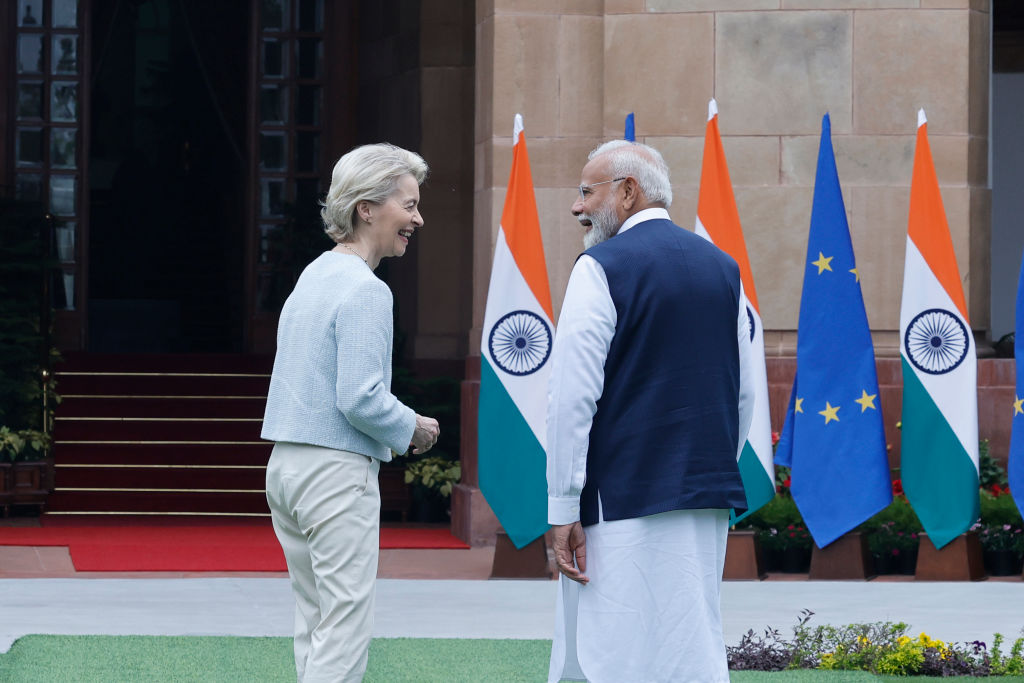The European Commission pledged to strengthen economic and security links with India on Wednesday, in Brussels’ latest effort to hedge against US protectionism and rising tensions with China and Russia.
In a 19-page policy document – which comes ahead of an anticipated free trade agreement by the end of this year – the EU executive laid out areas of potential cooperation with the world’s most populous country, including defence, technology, climate change, sustainable finance, and supply chain resilience.
“In an increasingly complex geopolitical and geoeconomic environment, closer EU-India cooperation is more important than ever,” the document states, adding that the pair are “natural strategic partners” that are “committed to strengthening cooperation across a wide spectrum”.
The move comes a month after US President Donald Trump slapped India with a 25% “secondary tariff” for purchasing Russian oil, angering New Delhi. A short time later, Indian Prime Minister Narendra Modi visited China for the first time in seven years.
Together with China and Russia, India is a founding member of the BRICS group of nations, whose calls for a “multipolar” world order have long been criticised as “anti-American” by Trump.
“When India speaks, much of the Global South listens,” a senior Commission official told reporters. “And so if we can work with India to soften some of the anti-Western rhetoric and action that’s emanating from some of the organisations that India is a member of and that we are not a member of, then I think that’s a useful thing.”
The official added that stronger EU-India ties would also help both sides “de-risk” from Beijing, whose relations with New Delhi have historically been fraught amid border tensions and a growing flood of cheap Chinese industrial exports.
The EU’s own ties with China have worsened considerably in recent months, with Beijing’s imposition of export controls on critical minerals prompting Brussels to speed up its efforts to reduce its strategic dependence on the world’s second-largest economy.
“We want to build our relations with India [for] their own sake – but we’re not divorced from the other geopolitical realities, be that China, or be it how the US is deciding its foreign policy stance with others,” the official said.
‘Not all singing and music and dancing’
However, India’s close relations with Russia – which date back to the Cold War period – remain a source of friction between Brussels and New Delhi.
India has sharply increased its purchases of Russian oil since Moscow’s full-scale invasion of Ukraine in 2022. It has also been accused of aiding Russia’s “shadow fleet” of oil vessels, which are used to evade a Western oil price cap.
New Delhi also has deep military links to the Kremlin, with Indian soldiers participating in this month’s “Zapad” military exercises alongside tens of thousands of Belarusian and Russian troops close to Belarus’ border with Poland.
The Commission official, however, said that India “has been trying to be useful” by fostering diplomatic ties with Kyiv since the start of the war, with Modi regularly speaking with Volodymyr Zelenskyy and even inviting his Ukrainian counterpart to visit India last month.
Ultimately, Brussels wants to “build an attractive offer” that will help India “understand where we’re coming from” over Ukraine, the official said.
“It’s not all joyous music and singing and dancing,” the official said. “But we understand it’s a longstanding relationship with Russia and we won’t change that overnight.”
Speaking to reporters later on Wednesday, Kaja Kallas, the EU’s top diplomat, said New Delhi’s ties with Moscow were an “obstacle” to closer EU-India cooperation, but warned it was also important not to “push” India into “Russia’s corner”.
“The question is always whether we leave this void to be filled by somebody else, or we try to fill it ourselves,” she said.
(vc)
UPDATE: The article has been updated with Kaja Kallas’ comments during the press conference.
